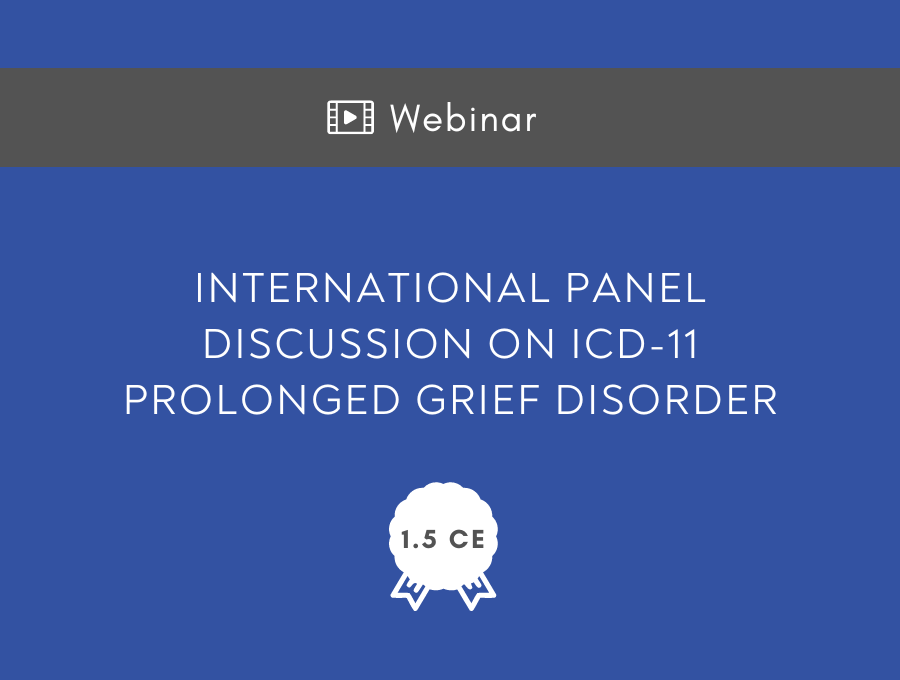
An International Panel Discussion on ICD-11 Prolonged Grief Disorder – 1.5 CE Hours
About Course
This webinar focuses on the clinical presentation of prolonged, impairing grief. Dr. Andreas Maercker (Switzerland) discusses ICD-11 diagnostic guidelines for Prolonged Grief Disorder. Dr. Lars Melhum (Norway) discusses differential diagnostic issues, with a particular focus on co-occurring conditions (such as major depression and post-traumatic stress disorder). Dr. Christine Mauro discusses how different diagnostic approaches compare to each other, and which ones are most useful for treatment planning. At the conclusion of the webinar, you will be able to apply ICD-11 guidelines in clinical practice, with appropriate attention to co-occurring psychiatric disorders, for purposes of treatment planning.Description
This 90-minute webinar will focus on the clinical presentation of prolonged, impairing grief. Dr. Andreas Maercker (Switzerland) will discuss ICD-11 diagnostic guidelines for Prolonged Grief Disorder. Dr. Lars Melhum (Norway) will discuss differential diagnostic issues, with a particular focus on co-occurring conditions (such as major depression and post-traumatic stress disorder). Dr. Christine Mauro (United States) will discuss how different diagnostic approaches compare to each other, and which ones are most useful treatment planning. Drs. Katherine Shear and Charles Reynolds will moderate the webinar to promote discussion among presenters and with participants in the audience. At the conclusion of the webinar, participants will be able to apply ICD-11 guidelines in clinical practice, with appropriate attention to co-occurring psychiatric disorders, for purposes of treatment planning.
Recorded on March 15, 2019.
Learning Objectives
- Describe the core and accessory features of PGD diagnosis according to ICD-11
- Identify psychiatric disorders commonly co-occurring with Prolonged Grief Disorder and describe the signs and symptoms that distinguish this disorder from differential diagnoses
- Compare and contrast the ICD-11 criteria for Prolonged Grief Disorder to those proposed by Prigerson et al., 2009
Presenters:
Andreas Maercker, MD PhD is chair and full professor of Psychopathology and Clinical Intervention at the University of Zurich, Switzerland. Dr. Maercker is or has been principal and co-investigator in numerous national and international studies in traumatic stress research, clinical gerontopsychology, electronic mental health and cultural clinical psychology and has published more than 200 peer review articles. He authored or edited 14 scientific or therapeutic books. He served on Board of the Directors in the national, European, and International Society for Traumatic Stress Studies. From 2011 to 2018 Dr. Maercker was chair of the working group “Disorders specifically associated with stress” at WHO’s ICD-11 development.
Lars Mehlum, MD PhD is the founding director of the National Centre for Suicide Research and Prevention at the Institute of Clinical Medicine, University of Oslo, Norway. He is the president of the International Academy of Suicide Research (IASR) and a past president of the International Association for Suicide Prevention (IASP) and the European Society for the Study of Personality Disorders (ESSPD). Over many years he has been an advisor on mental health and suicide prevention in his home country, to the WHO, the EU and governments in countries such as the US, China and Germany. With his research group he focuses on the clinical studies of people with suicidal and self-harming behaviour and mental health problems and the efficacy of interventions.
Christine Mauro, PhD is an Assistant Professor in the Department of Biostatistics at Columbia University. Her research focuses on the application of statistics to mental health disorders, psychiatry, substance use, and health policy. Dr. Mauro’s expertise includes the design and analysis of clinical trials and the analysis of data from observational studies. Dr. Mauro has been working with Dr. Shear on Complicated Grief since 2011. She has co-authored papers on the treatment of Complicated Grief, scale development for the measurement of grief-related symptoms, and assessing the diagnostic performance of competing criteria sets for Complicated Grief. Her statistical methods work has focused on developing empirical methods to derive criteria sets for the DSM, using Complicated Grief as a motivating example.
Moderators:
M. Katherine Shear, MD is the Marion E. Kenworthy Professor of Psychiatry and the founding Director of the Center for Complicated Grief at Columbia School of Social Work. Dr. Shear is a clinical researcher who first worked in anxiety and depression. For the last two decades she has focused on understanding and treating people who experience persistent intense grief. She developed and tested complicated grief treatment (CGT) a short-term targeted intervention and confirmed its efficacy in three large NIMH-funded studies. CGT is strength-based and focused on fostering adaptation to loss. Dr. Shear is widely recognized for her work in bereavement, including both research and clinical awards from the Association for Death Education and Counseling and invited authorship of articles for Uptodate and the New England Journal of Medicine.
Charles F. Reynolds III, MD is the Distinguished Professor of Psychiatry (emeritus) at the University of Pittsburgh School of Medicine; Adjunct Professor of Psychiatry at the Tufts University School of Medicine; and, in addition, serves as Editor-in-Chief of the American Journal of Geriatric Psychiatry. Prior to July 2017, Dr. Reynolds served as the UPMC Endowed Professor in Geriatric Psychiatry, Professor of Behavioral and Community Health Sciences at the Pitt Graduate School of Public Health, Director of the Aging Institute of the UPMC and University of Pittsburgh, the NIMH-sponsored Center of Excellence in the Prevention and Treatment of Late Life Mood Disorders, the John A. Hartford Center of Excellence in Geriatric Psychiatry, and the DSM-5 Sleep-Wake Disorders Workgroup. He is currently serving as a member of the Lancet Depression Commission of the World Psychiatric Association.
Continuing Education
American Psychological Association
The Center for Prolonged Grief at Columbia School of Social Work is approved by the American Psychological Association to sponsor continuing education for psychologists. The Center for Prolonged Grief maintains responsibility for this program and its content.
Note: Many state boards recognize the APA approval. Please check with your state licensing board.
New York State Education Department
- NYSED State Board for Psychology recognizes the Center for Prolonged Grief as an approved provider of continuing education for licensed psychologists (#PSY-0150).
- NYSED Board for Social Work recognizes the Center for Prolonged as an approved provider of continuing education for licensed social workers (#SW‐0727).
- NYSED State Board for Mental Health Practitioners recognizes the Center for Prolonged Grief as an approved provider of continuing education for licensed marriage and family therapists (#MFT-0080).
Note: Non-NYS social workers, marriage and family therapists, and other professionals, please check with your state licensing board. Many states have recognized our continuing education programs as we are at a CSWE-accredited institution and part of a regionally accredited university.
Course Content
An International Panel Discussion on ICD-11 Prolonged Grief Disorder
-
Watch the webinar
00:00 -
Take the post-test
-
Post-webinar evaluation
00:00
About the instructors
34 Courses
347 students
22 Courses
0 students
